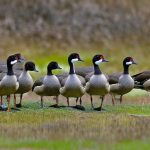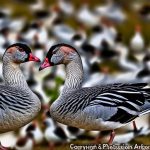Having geese constantly hanging out by your back door can be quite an annoyance. Not only do they leave behind a mess, but they can also be aggressive and pose a potential danger to you and your family. In this post, we will discuss various methods that can be used to keep geese away from your back door and ensure a peaceful and clean outdoor space.
Key Takeaways
- Geese are social animals that mate for life and are highly protective of their young.
- Geese are attracted to back doors because they provide easy access to food and water sources.
- Physical barriers such as fences or netting can be effective in keeping geese away from your property.
- Motion-activated sprinklers can startle geese and discourage them from returning to your property.
- Decoys such as fake predators or other animals can trick geese into thinking your property is already occupied.
- Creating a designated feeding area away from your back door can redirect geese to a more suitable location.
- Noise deterrents such as loud noises or predator calls can scare geese away from your property.
- Planting natural deterrents such as tall grass or thorny bushes can make your property less attractive to geese.
- Seeking professional help from wildlife experts can ensure safe and humane removal of geese from your property.
- Consistently enforcing your chosen method to keep geese away from your back door is key to long-term success.
Understanding the behavior of geese
Geese are migratory birds that travel in large flocks. They have a strong instinct to congregate in certain areas, especially during their migration periods. Geese are attracted to open spaces with access to water and food sources. They are also social animals and tend to gather where other geese are present.
Identifying the reasons why geese are attracted to your back door
Your backyard may be particularly appealing to geese as a feeding ground. Geese are herbivores and feed on grass, plants, and grains. If your backyard has lush green grass or a vegetable garden, it can be an attractive food source for them. Additionally, if you have a pond or any other water source nearby, it can further attract geese.
Having geese so close to your home can also pose potential dangers. Geese can become aggressive, especially during their nesting season when they are protecting their eggs or goslings. They may hiss, flap their wings, or even charge at humans or pets that come too close.
Using physical barriers to keep geese away
One effective method to keep geese away from your back door is by using physical barriers such as fences or netting. Fences should be at least three feet tall to prevent geese from easily hopping over them. Netting can be installed over areas where geese tend to congregate, such as ponds or gardens.
It is important to ensure that the barriers are tall enough and properly installed to be effective. Geese are strong birds and can easily fly over or push through weak barriers. Regular maintenance and repairs may be necessary to keep the barriers in good condition.
Installing motion-activated sprinklers to deter geese
Motion-activated sprinklers can be an effective and humane way to deter geese from your backyard. These sprinklers are equipped with motion sensors that detect the presence of geese or other animals. When triggered, the sprinklers release a burst of water, scaring away the geese.
The benefits of using a motion-activated system are twofold. Firstly, it provides an immediate deterrent when geese approach your back door. Secondly, it conditions the geese to associate your backyard with an unpleasant experience, discouraging them from returning in the future.
Using decoys to trick geese into thinking your property is already occupied

Another method to keep geese away from your back door is by using decoys. Decoys are life-sized replicas of geese or other predators that trick geese into thinking your property is already occupied. There are different types of decoys available, including stationary ones and ones that move with the wind.
It is important to periodically move the decoys around to maintain their effectiveness. Geese can become accustomed to stationary decoys and realize they are not a threat. By moving them around, you create the illusion of movement and increase the chances of deterring geese.
Creating a designated feeding area away from your back door
Creating a designated feeding area away from your back door can help redirect geese to a more suitable location. This can be done by setting up a separate feeding station with food specifically for geese. By providing an alternative food source away from your back door, you can discourage geese from congregating in that area.
The benefits of having a designated feeding area include reducing the mess and damage caused by geese near your home. It also helps to keep geese away from areas where they may pose a potential danger to you or your family. It is important to keep the feeding area clean and regularly remove any leftover food to prevent attracting other pests.
Using noise deterrents to scare geese away
Noise deterrents can be an effective method to scare geese away from your back door. There are various types of noise deterrents available, including devices that emit loud noises, such as sirens or ultrasonic sounds, or ones that mimic the distress calls of geese or other predators.
It is important not to use noise deterrents too frequently, as geese can become habituated to the sounds and ignore them over time. It is best to use noise deterrents sporadically and in combination with other methods to maximize their effectiveness.
Planting natural deterrents such as tall grass or thorny bushes
Planting natural deterrents can be a long-term solution to keep geese away from your back door. Tall grasses or thorny bushes can create an unappealing environment for geese, as they prefer open spaces with easy access to food sources.
The benefits of using natural deterrents include creating a more aesthetically pleasing landscape and providing habitat for other wildlife. It is important to choose the right plants for your area and ensure they are properly maintained to be effective in deterring geese.
Seeking professional help to safely remove geese from your property
If all else fails, it may be necessary to seek professional help to safely remove geese from your property. Professional wildlife control experts have the knowledge and experience to handle geese in a humane and effective manner. They can assess the situation, develop a customized plan, and implement strategies to remove geese from your property.
It is important to seek professional help rather than attempting to remove geese on your own, as geese can be aggressive and potentially dangerous. Professional wildlife control experts have the necessary equipment and training to handle geese safely and minimize any risks.
Consistently enforcing your chosen method to keep geese away from your back door
Consistency is key when it comes to keeping geese away from your back door. Once you have chosen a method or combination of methods, it is important to consistently enforce them to ensure their effectiveness. Geese are intelligent animals and can quickly adapt to changes in their environment.
Failure to consistently enforce your chosen method may result in geese returning to your back door or finding new ways to access your property. It is important to regularly monitor the situation and make any necessary adjustments to maintain a goose-free environment.
In conclusion, there are various methods that can be used to keep geese away from your back door. These include using physical barriers, installing motion-activated sprinklers, using decoys, creating a designated feeding area, using noise deterrents, planting natural deterrents, seeking professional help, and consistently enforcing your chosen method.
It may take some trial and error to find the most effective method for your specific situation. It is important to be patient and persistent in your efforts to keep geese away from your back door. By implementing these methods and consistently enforcing them, you can create a peaceful and clean outdoor space free from the annoyance and potential dangers of geese.
If you’re looking for ways to keep geese away from your back door, you might also be interested in learning about how to create a secure and predator-proof floor for your chicken coop. A well-designed coop floor can not only protect your chickens from potential threats but also prevent unwanted visitors like geese from entering. Check out this informative article on poultrywizard.com that provides valuable insights and tips on creating the perfect floor for your chicken coop: https://poultrywizard.com/keeping-chickens/floor-of-chicken-coop/.
FAQs
What are some effective ways to keep geese away from my back door?
There are several methods that can be effective in keeping geese away from your back door. These include using decoys, installing fencing or netting, using repellents, and modifying the landscape.
What kind of decoys can I use to keep geese away?
Decoys that resemble natural predators of geese, such as coyotes or owls, can be effective in deterring geese. Some people also use decoys that resemble other geese to create the impression that the area is already occupied.
What kind of fencing or netting should I use?
Fencing or netting that is at least 3-4 feet tall can be effective in keeping geese away. The fencing or netting should be sturdy and difficult for the geese to penetrate. Electric fencing can also be effective in deterring geese.
What kind of repellents can I use?
There are several types of repellents that can be effective in keeping geese away. These include visual repellents, such as reflective tape or balloons, and auditory repellents, such as loud noises or predator calls. Chemical repellents, such as Methyl Anthranilate, can also be effective.
How can I modify the landscape to keep geese away?
Modifying the landscape can involve removing or reducing areas of standing water, which geese are attracted to. Planting vegetation that geese do not like, such as prickly bushes or tall grasses, can also be effective. Additionally, removing food sources, such as fallen fruit or birdseed, can help deter geese.
Meet Walter, the feathered-friend fanatic of Florida! Nestled in the sunshine state, Walter struts through life with his feathered companions, clucking his way to happiness. With a coop that’s fancier than a five-star hotel, he’s the Don Juan of the chicken world. When he’s not teaching his hens to do the cha-cha, you’ll find him in a heated debate with his prized rooster, Sir Clucks-a-Lot. Walter’s poultry passion is no yolk; he’s the sunny-side-up guy you never knew you needed in your flock of friends!







